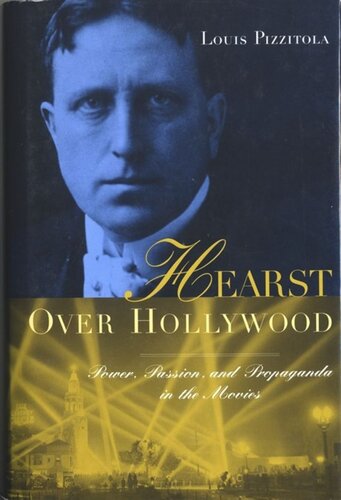

Most ebook files are in PDF format, so you can easily read them using various software such as Foxit Reader or directly on the Google Chrome browser.
Some ebook files are released by publishers in other formats such as .awz, .mobi, .epub, .fb2, etc. You may need to install specific software to read these formats on mobile/PC, such as Calibre.
Please read the tutorial at this link: https://ebookbell.com/faq
We offer FREE conversion to the popular formats you request; however, this may take some time. Therefore, right after payment, please email us, and we will try to provide the service as quickly as possible.
For some exceptional file formats or broken links (if any), please refrain from opening any disputes. Instead, email us first, and we will try to assist within a maximum of 6 hours.
EbookBell Team

4.8
44 reviewsHearst Over Hollywood draws on hundreds of previously unpublished letters and memos, FBI Freedom of Information files, and personal interviews to document the scope of Hearst's power in Hollywood. Louis Pizzitola tells the hidden story of Hearst's shaping influence on both film publicity and film censorship as well as the growth of the "talkies," and the studio system.
Hollywood—crossroads of filmmaking, mythmaking, and politics—was dominated by one man more than any other for most of its history. It was William Randolph Hearst who understood how to use cinema to exploit the public's desire for entertainment and to create film propaganda to further his own desire for power. From the start, Hearst saw his future and the future of Hollywood as one and the same. He pioneered and capitalized on the synergistic relationship between yellow journalism and advertising and motion pictures. He sent movie cameramen to the inauguration of William McKinley and the front lines of the Spanish-American War. He played a prominent role in organizing film propaganda for both sides fighting World War I. By the 1910s, Hearst was producing his own pictures—he ran one of the first animation studios and made many popular and controversial movie serials, including The Perils of Pauline (creating both the scenario and the catchphrase title) and Patria. As a feature film producer, Hearst was responsible for some of the most talked-about movies of the 1920s and 1930s. Behind the scenes in Hollywood, Hearst had few equals—he was a much-feared power broker from the Silent Era to the Blacklisting Era.
Hearst Over Hollywood draws on hundreds of previously unpublished letters and memos, FBI Freedom of Information files, and personal interviews to document the scope of Hearst's power in Hollywood. Louis Pizzitola tells the hidden story of Hearst's shaping influence on both film publicity and film censorship—getting the word out and keeping it in check—as well as the growth of the "talkies," and the st